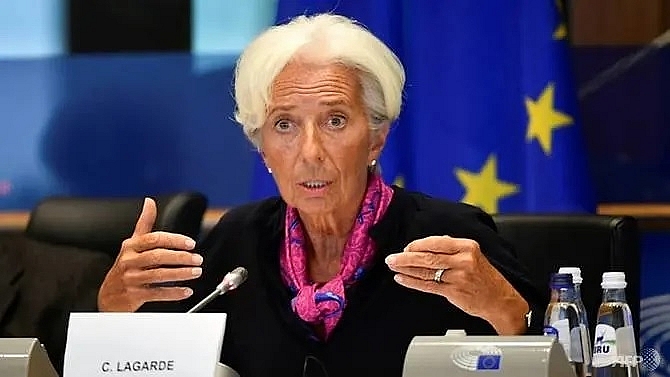ECB's Lagarde in spotlight as policy on hold
 |
| ECB president Christine Lagarde has been outspoken about the bank's possible role in tackling climate change, which she has said is a "high priority" AFP/JOHN THYS |
The 25-strong governing council left the ultra-loose measures of Lagarde's predecessor Mario Draghi in place at her maiden meeting, a spokesman said.
But the former International Monetary Fund chief can expect a grilling at a 2.30pm (9.30pm Singapore time) post-meeting press conference about her planned "strategic review" of the ECB's objectives and way of working.
The timing and scope of the huge undertaking remain unclear, but it could lead to a major shake-up amid calls for the ECB to rethink its inflation target and take more climate action.
Lagarde "could announce the starting date - likely in early 2020 - of the first review of (ECB) monetary policy strategy since 2003," said Berenberg bank economist Florian Hense.
With a background in corporate law, Lagarde is the first ECB chief who is not a trained economist.
But she is admired as an effective communicator.
"Monetary policy involves a lot of subtle signalling and it remains to be seen if and how Lagarde will be willing to drop policy hints, or use code words to guide markets," said Frederik Ducrozet of Pictet Wealth Management.
Lagarde herself has appealed for patience, saying she has been on a steep learning curve since taking up the job last month.
"I am trying to learn German, but I am also trying to learn central bank language," the one-time French finance minister told MEPs last week, acknowledging the market-moving impact of even a single ambiguous word.
UNPRECEDENTED SPAT
In his final act as ECB chief, Draghi in September unveiled fresh stimulus to bolster the 19-nation euro area, which has been weighed down by US-China trade tensions, Brexit uncertainty and a weakening manufacturing sector.
As well as offering a new round of cheap credit to lenders, the ECB slashed a key interest rate deeper into negative territory and kept others at historic lows.
The bank also restarted a controversial bond-buying programme to the tune of 20 billion euros (US$22 billion) a month, in the hopes of encouraging spending and investment.
But several of the ECB's 25 governing council members opposed the asset purchases, leading to an unprecedented public spat.
One of Lagarde's first moves upon arriving in Frankfurt was to take the council on a retreat to heal the rift - and ECB watchers will be keen for an update.
TOOL KIT
Lagarde will also unveil Thursday the ECB's latest growth and inflation projections, which for the first time will run through to 2022.
Eurozone growth is forecast to reach just 1.1 per cent this year, while price growth remains stubbornly low despite years of stimulus.
Inflation stood at just 1 per cent in November, fuelling debate about whether the goal is still appropriate.
While Lagarde has signalled she will stick close to Draghi's easy-money policies, concerns are mounting about the negative impact of subzero rates on banks and savers.
Draghi's final moves lowered the ECB's deposit rate to -0.5 per cent, meaning banks have to pay more to park their excess cash at the ECB.
Lenders have long complained that the fees, on top of the ECB's other stimulus efforts, are squeezing their already tight profit margins, and some are even passing the costs on to small retail clients.
GOING GREEN
Faced with a slew of challenges, Lagarde is expected to echo Draghi's frequent call for eurozone governments to support the economy through fiscal policy.
Unlike her predecessor, however, Lagarde has been outspoken about the bank's possible role in tackling climate change, which she has described as "high priority".
That could range from building climate risks into the ECB's economic models to greener investments.
The first female president of the ECB has also said she wants to bring the bank closer to the public by ditching some of the jargon.
What the stars mean:
★ Poor ★ ★ Promising ★★★ Good ★★★★ Very good ★★★★★ Exceptional
Related Contents
Latest News
More News
- Cashless payments hit 28 times GDP in 2025 (February 04, 2026 | 18:09)
- SSIAM and DBJ launch Japan Vietnam Capital Fund (February 04, 2026 | 15:57)
- Banks target stronger profits, credit growth in 2026 (February 04, 2026 | 15:43)
- Vietnam on path to investment-grade rating (February 03, 2026 | 13:07)
- Consumer finance sector posts sharp profit growth (February 03, 2026 | 13:05)
- Insurance market building the next chapter of protection (February 02, 2026 | 11:16)
- NAB Innovation Centre underscores Vietnam’s appeal for tech investment (January 30, 2026 | 11:16)
- Vietnam strengthens public debt management with World Bank and IMF (January 30, 2026 | 11:00)
- Corporate bond market poised for stronger growth cycle (January 28, 2026 | 17:13)
- Vietnam's IPO market on recovery trajectory (January 28, 2026 | 17:04)

 Tag:
Tag:




















 Mobile Version
Mobile Version